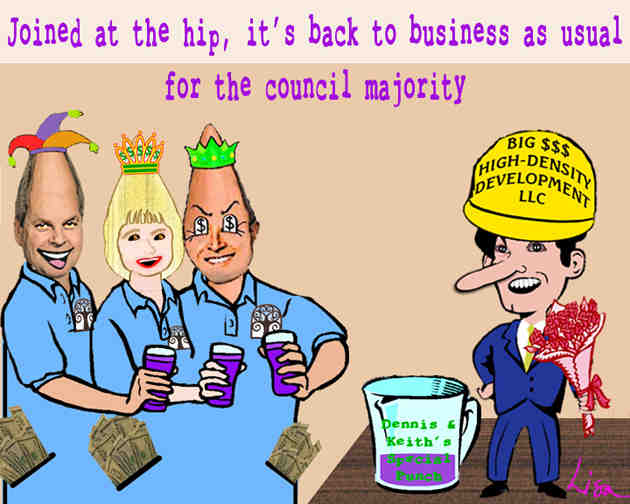|
|
|
City Business as Usual Following years of neglect, city hall put street resurfacing into high gear before the Nov. 2 election. Residents shouldn’t expect the process to continue. For one thing, funding doesn’t exist to bring all streets up to good condition. More than a year ago, a city employee estimated the cost at $85 million to meet the current need for resurfacing. Streets still needing work can be found in large residential developments that haven’t been touched. Additionally, streets resurfaced during the past two years are already cracking and losing chunks of asphalt. Current roadwork that should have been done during dry summer months is now being interrupted and delayed by rain. Streets in poorest condition can be found in neighborhoods west of Olympiad, south of Jeronimo, east of Marguerite and north of La Paz. Another neglected area is west of Felipe between La Paz and Oso. A resident reported, “If homeowners didn’t call city hall and ask for repair of damage at a specific address, their streets weren’t patched. No one should get the mistaken impression that city employees are coming out to inspect streets.” Instead of staying focused on road improvement during the election, the city staff engaged in a debate over the history of street repair. Documents show that the city proposed and approved a plan during the 1990s to implement a 5-year cycle for street resurfacing. Instead of acknowledging that the current 7-year plan is inadequate, the city staff wanted to argue about whether or not the 5-year plan had ever been put into effect. Despite a national trend of incumbents losing their jobs in the November 2 election, Trish Kelley and Dave Leckness received enough votes to stay on the city council. Uninformed voters tend to choose incumbents on the basis of name recognition, which benefited both Kelley and Leckness. Both incumbents also had collected ample vendor money and other donations from out-of-town and special interest to wage an air war of mailers. With the reelection of two incumbents – maintaining the council majority of Kelley, Leckness and Frank Ury – residents should expect more of the same. The status quo includes neglect of infrastructure, diversion of funds to feel-good activities and continuation of mismanaged capital improvement projects. While Kelley and Leckness together received 27,422 votes, the 10 challengers amassed 57,423 votes. The city election outcome should not be interpreted as voter satisfaction with what the incumbents are doing. |
|||
 |
|||